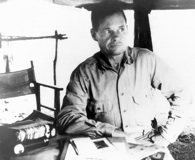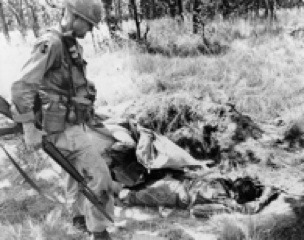July 2008 Mailbag
Cheating?
 Shame on you for cheating! Hal Moore and Chesty Puller certainly were great battle leaders, but their battle prowess was only tested while in command at the battalion and regimental level, not as generals. Putting them on your list among the top generals in the modern era is unfair to the many other “great” generals who actually proved their mettle and generalship in battle while actually serving as generals – men such as James Van Fleet and Oliver P. Smith during the Korean War; Israel Tal and Ariel Sharon during the Six Day War; Rafael Eitan, Dan Laner, Moshe Peled, Avraham Adan, and Ariel Sharon (again) during the Yom Kippur War, and Norman Schwartzkopf [sic] during Operation Desert Storm.
Shame on you for cheating! Hal Moore and Chesty Puller certainly were great battle leaders, but their battle prowess was only tested while in command at the battalion and regimental level, not as generals. Putting them on your list among the top generals in the modern era is unfair to the many other “great” generals who actually proved their mettle and generalship in battle while actually serving as generals – men such as James Van Fleet and Oliver P. Smith during the Korean War; Israel Tal and Ariel Sharon during the Six Day War; Rafael Eitan, Dan Laner, Moshe Peled, Avraham Adan, and Ariel Sharon (again) during the Yom Kippur War, and Norman Schwartzkopf [sic] during Operation Desert Storm.
Stuart Kohn
Maplewood, NJ
Thanks very much. The original title of our “Greatest” article was “History’s 100 Greatest Commanders,” but was changed to “Generals” during final layout of the article (hence, Moore, Puller, Mao and many of the ancients who were not technically “generals” being on the list).
Fans of Gen. James Van Fleet will be interested in reading our History’s Mysteries article in the May 2008 ACG – we reveal the “mystery man” whom Gen. George C. Marshall confused for many years with Van Fleet and explain why Marshall blocked Van Fleet’s promotion to general until the confusion finally was cleared up in mid-1944. Van Fleet was promoted rapidly after that, reaching the rank of 4-star general and leading US forces during the Korean War.
We have featured the exploits of Israeli commanders Peled and Adan in previous ACG articles (Battlefield Leader and You Command departments) and both clearly were outstanding leaders as you pointed out.
 We will reserve comment on Gen. Schwarzkopf, but would point out that the stunning success of Operation Desert Shield/Desert Storm was chiefly due to the largely unheralded accomplishments of numerous subordinates, including: Gen Chuck Horner, USAF, leader of the devastating air campaign; Gen Gus Pagonis, the logistical genius who accomplished the Herculean task of moving half a million troops and all necessary supplies and tools of war to the theater of war; and outstanding ground commanders such as Gen. Walter Boomer, USMC, Gen. Gary Lucks, Gen. Fred Franks, Gen. Barry McCaffrey, and aggressive young colonels such as Monty Meigs, Tom Hill, Jim Riley and Don Holder (all later generals). Other unsung heroes of the Gulf War who, unlike Schwarzkopf, did not hog the public limelight during the war, include the so-called “Jedi Knights” (the Army majors who were graduates of the Command & General Staff College’s Advanced Military Studies Program) who developed the Coalition’s brilliantly successful plan of attack, and a civilian (although a West Point graduate), Mr. Robert Kimmitt, the US State Department undersecretary who virtually single-handedly put together the Allied coalition of European and Arab nations that made the entire operation possible. All of the above deserve the credit for the success of Operation Desert Shield/Desert Storm that was instead heaped upon “Stormin’ Norman.”
We will reserve comment on Gen. Schwarzkopf, but would point out that the stunning success of Operation Desert Shield/Desert Storm was chiefly due to the largely unheralded accomplishments of numerous subordinates, including: Gen Chuck Horner, USAF, leader of the devastating air campaign; Gen Gus Pagonis, the logistical genius who accomplished the Herculean task of moving half a million troops and all necessary supplies and tools of war to the theater of war; and outstanding ground commanders such as Gen. Walter Boomer, USMC, Gen. Gary Lucks, Gen. Fred Franks, Gen. Barry McCaffrey, and aggressive young colonels such as Monty Meigs, Tom Hill, Jim Riley and Don Holder (all later generals). Other unsung heroes of the Gulf War who, unlike Schwarzkopf, did not hog the public limelight during the war, include the so-called “Jedi Knights” (the Army majors who were graduates of the Command & General Staff College’s Advanced Military Studies Program) who developed the Coalition’s brilliantly successful plan of attack, and a civilian (although a West Point graduate), Mr. Robert Kimmitt, the US State Department undersecretary who virtually single-handedly put together the Allied coalition of European and Arab nations that made the entire operation possible. All of the above deserve the credit for the success of Operation Desert Shield/Desert Storm that was instead heaped upon “Stormin’ Norman.”
Pages: 1 2


In your July 08 edition on page 68 there is a picture of Reuben James saving Stephen Deccatur, the caption reads that the unknown sailor, though wounded, gives his life by taking the scimitar blow that was meant for Decatur. The problem is that Reuben James, who is not mentioned by name, survived the scimitar wound and retired from the Navy in 1836 and died in Washington DC in December 1839. I hope this helps set the record straight for the readers of your fine magazine.
V/R
Dennis K. Repke
Annapolis, MD
SFC (Ret)
General Eric von Manstein
The recent article on General Eric von Manstein was very well written. However the author seriously short changed the General on his service to Germany after the war.
General von Manstein was more than just “a long time advisor. He was called on by the West German Chancellor Konrad Adenauer to served as his senior defense advisory and chair a military sub-committee appointed to advise the parliament on military organization and doctrine for the new German Army, the Bundeswehr and its incorporation into NATO. He later moved with his family to Bavaria. His war memoirs, Verlorene Siege (Lost Victories), were published in Germany in 1955, and translated into English in 1958. In them, he presented the thesis that if the generals had been in charge of strategy instead of Hitler, the war on the Eastern Front could have been won.
Never having been a member of the Nazi party, he had no trouble in West Germany, unlike some of the Reich’s more notorious Hitler supporters. Because of his influence, for the first few years of the Bundeswehr, he was seen as the unofficial chief of staff. Even later, his birthday parties were regularly attended by official delegations of Bundeswehr and NATO top leaders, such as General Hans Speidel who was the Commander-in-Chief of the Allied ground forces in Central Europe from 1957 to 1963. This was not the case with pro-Nazi Field Marshals such as Milch, Schörner, von Küchler, and others, who were disregarded and forgotten after the war.
Erich von Manstein suffered a stroke and died in Munich on the night of 9 June 1973. He was buried with full military honors. His obituary in The Times on June 13, 1973, stated that “His influence and effect came from powers of mind and depth of knowledge rather than by generating an electrifying current among the troops or ‘putting over’ his personality.”
I would think that the many honours bestowed on him by the new German defence establishment should be more than enough to establish his credibility. I fully agree with the closing statement in the article, that ” ACG readers are advised to closely examine the evidence on both sides, and then judge for themselves if Manstein’s “Lost Victories” claim rings true.”
That would of course entail actually reading the book, and supportive documents; as well as the full circumstances behind his war crimes trial. At the end of the day please remember one thing—-He was the one and only WWII German General to hold the post war positions that he did. I knew the General personally, and I believe that the belief that had Hitler let his general’s run the War that events may have unfolded differently. There are some inherent problems with Heads of State being Commander-In-Chief of their national military.
Dear Colonel John Antal In the attack of the T-72 tanks with the M1A1 in Iraq, I would right flank & attack & in line so that 4 of the T-72 would be in line & only one of them could fire.Then I would reposition & continue picking them off as they couldn’t fire without shooting their own tank in front of them. Best Regards warren Great magazine!!!